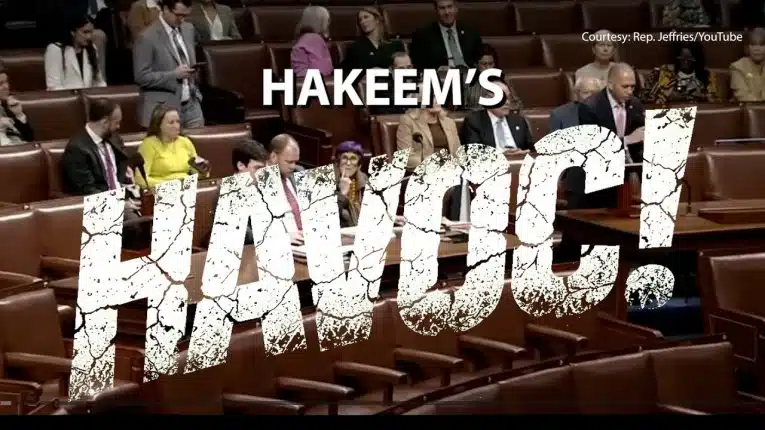
Democrats are openly hoping Republicans will go nuclear to pass their continuing resolution.
Congressional Democrats keep lying to the American people and anyone else who will listen that Senate Republicans somehow “have the votes” to pass their continuing resolution — they keep saying it.
That is, Republicans would have the votes to pass the continuing resolution (or anything else) if only they would just abolish (i.e. break) Senate filibuster rules requiring three-fifths of the Senate to advance legislation.
A version of the argument was published by Bloomberg columnist Matthew Ygeslias on Oct. 5, “Republicans Can Easily End the Shutdown If They Want To,” who urged, “the filibuster itself can be overcome… When the majority party wants to pass something and ‘can’t’ because of the filibuster, it changes the rules… If Republicans want to reopen the government, nothing is stopping them.”
Here’s Senate Democrats’ game: Either Senate Republicans just let the minority write the continuing resolution — and permanently expand Obamacare tax credits and gut the One Big Beautiful Bill’s prohibitions on illegal aliens receiving Medicaid and Obamacare insurance subsidies — or the only other way they can expect to get the government reopened is by ending the filibuster.
Those are the options Senate Democrats are leaving with Senate Majority Leader John Thune (R-S.D.).
Either way suits Democrats. The goal is so that Senate Minority Leader Chuck Schumer (D-N.Y.) and other Senate Democrats won’t have to get their hands dirty by being seen politically as helping Trump. It’s politically necessary for Democrats to join the “resistance”. All Democrats can do is say no — or else they fear primaries and a potential change of leadership.
In the meantime, after trying (and failing) to abolish the filibuster in 2022 to pass their H.R.5746 election takeover bill, Senate Democrats wouldn’t mind if Republicans did it for them.
Democrats might also be betting that the first party to abolish the filibuster while having the trifecta of the House, Senate and White House will be crushed in the subsequent Congressional midterms because of the obvious overreach. Given the low odds Republicans would try, Democrats don’t seem to think they have much to lose by waiting it out during the shutdown.
Simultaneously, they might be intending to leave President Donald Trump with no other choice to get the government reopen even with a clean continuing resolution.
Never mind that there likely aren’t enough Republican votes in the Senate to do that. Who thinks that Sen. Susan Collins (R-Maine) or Sen. Lisa Murkowski (R-Alaska) want to break long-standing Senate rules so that either party would be able to pass partisan appropriations and other bills — including those impacting Social Security and Medicare — without input from both parties?
So, Republicans would divide on the issue if it came up, and once again, it would require Democratic votes, only this time to abolish the filibuster.
In 2022, when Democrats attempted this — at the time they had proposals to federalize the elections, to pack the Supreme Court, to make D.C. and Puerto Rico states to pack the Senate and to impose the Green New Deal all ready to go — Republicans cried foul and Democratic-caucusing former Senators Kirsten Sinema and Joe Manchin stopped them. They’re now gone and, with them, presumably, any Democratic Party opposition to abolishing the filibuster when they eventually get back in power.
If so, Democrats would be aware Republicans lack the votes to end the filibuster, so they’d have to join in the effort. Presumably, assuming they’re not bluffing, then Senate Democrats would be helping President Donald Trump and Congressional Republicans enact their agenda that they just shut down the government to stop. What then, will Democrats pretend they are outraged that Republicans ended the filibuster? What a joke.
In short, Democrats won’t offer their votes to get to cloture for another month for appropriators to work things out or any other Republican proposal, but maybe they’ll vote to abolish the filibuster to “help” Trump pass his spending bill they shut the government down for? Make it make sense.
We therefore still have not seen what the true fallout of abolishing the filibuster might be — if any, a lot depends on public awareness and perceptions of a somewhat arcane Senate procedure — but the conventional political wisdom has always been in D.C. that if one of the parties were ever to attempt to end the legislative filibuster, as it has for appointments, the opposition party will use it as a rallying cry against the bid for absolute power.
Whoever does it, it won’t be popular, or else somebody would have done it by now. Democrats might be hoping Republicans just get it over with, potentially putting the U.S. Senate in play in 2026.
Yes, a party could change Senate rules and temporarily run the table on their political program, but it better be super popular (or important). When that party meets voters in the next election, it could be a landslide for the opposition. This time, that could make Democrats the biggest beneficiary. It’s practically guaranteed to backfire.
Whereas, if Democrats were to try it later, then Republicans might ultimately benefit. It could be rocket fuel for the midterms whenever it happens.
The truth is, nobody knows what would happen. But right now, to pass law under current Senate rules, besides budget resolutions, requires some semblance of bipartisanship by getting to 60 votes.
Rule XXII of the standing rules of the Senate (now often overturned to get appointments through on simple majorities) states “at any time a motion signed by sixteen Senators, to bring to a close the debate upon any measure, motion, other matter pending before the Senate… the Presiding Officer shall, without debate, submit to the Senate by a yea-and-nay vote the question: ‘Is it the sense of the Senate that the debate shall be brought to a close?’ And if that question shall be decided in the affirmative by three-fifths of the Senators duly chosen and sworn… then said measure, motion, or other matter pending before the Senate, or the unfinished business, shall be the unfinished business to the exclusion of all other business until disposed of…”
For example, to change Social Security, Medicare and other entitlements. It’s supposed to be hard.
The Democrats’ own continuing resolution proposal on its face is ridiculous and would require President Donald Trump to disenfranchise his own voters by breaking key campaign promises to deny taxpayer subsidies to illegal aliens and rein in Obamacare. They know the proposal is unacceptable. That’s the whole point.
When Republicans in 2013 tried the same thing to defund Obamacare, which would have required then-President Obama to gut his own signature legislation, it was practically laughed off by Democrats. Most watching had little hope that the gambit would work.
Democrats in 2025 now want to normalize the procedure — but they might be willing to hang onto the shutdown, especially if they don’t feel like they’re being blamed for it as an Oct. 1 Washington Post poll shows. We should consider how uncharacteristic this really is.
The Obamacare enhanced premium tax credits, started during Covid in 2021 by former President Biden, were sunset for the end of 2025 by Democrats in the 2022 Inflation Reduction Act. They could have made them permanent but chose not to. It has nothing to do with the One Big Beautiful Bill Act or anything else President Trump has done.
Democrats lost the House in the 2022 midterms, and then the Senate and White House in 2024, and so have for three years lacked the votes to extend the expansion of the health premium subsidies even on simple majorities. Now they are desperate.
It would be like if the Republicans had lost in 2024 and then their 2017 tax cuts were set to expire, and so then they shut down the government expecting a President Kamala Harris would sign the bill to renew the tax cuts when she had explicitly campaigned against them. Democrats would say that the election had already decided the issue.
Taken at face value, then, Democrats might intend to leave the government shutdown indefinitely should their demands not be met.
Mass layoffs by Trump could similarly lock Democrats in even further. Suffice to say, the President might ultimately be left with no other choice, and if so that’s fine — Americans for Limited Government supports the layoffs — but then he also should not expect to pass anything after the layoffs. Not for a long time.
Democrats will go into complete rebellion and he’ll lose at least one Republican, including Collins but perhaps more, in the Senate. All hopes of a clean bipartisan continuing resolution will be gone for the foreseeable future. Trump said the cuts would be “irreversible” and he’s right in more ways than one. The Senate could completely shut down.
If nothing else, it should only be viewed as a last resort, after which other options will be foreclosed. It is its own nuclear option.
Either way, Republicans might be better off waiting Senate Democrats out for now. Senate Leader Thune can similarly diffuse the cloture maneuver just by standing with Senate Republicans and saying no, Senate Republicans will not move to overturn the filibuster on legislation.
There’s no rush.
If by, say, Halloween, and nobody’s budging, then the President should seriously begin considering the layoffs if Democrats truly have no intention of moving on the shutdown at all.
Yes, Republicans “have the votes” to pass their continuing resolution in the same sense that the U.S. and Russia have nuclear weapons. Sure, they could be used, but the reason abolishing the filibuster is called the nuclear option is because it’s mutually assured destruction. That’s irreversible, too.
Robert Romano is the Executive Director of Americans for Limited Government.






